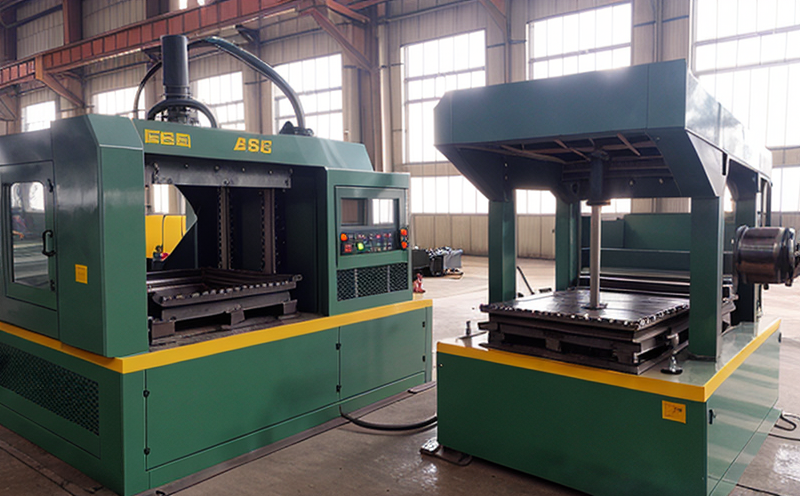ASTM A370 Mechanical Testing of Forged Steels
The ASTM A370 standard is a comprehensive set of procedures that enables accurate characterization and quality assessment of forged steels. This test protocol covers tensile testing, which evaluates the mechanical properties of metallic materials under uniaxial tension. The results obtained from this process are essential for ensuring product integrity, compliance with industry standards, and overall safety in industrial applications.
The ASTM A370 standard is widely recognized globally as a benchmark for quality control and assurance in the manufacturing sector. It specifies the method of testing to determine the tensile properties of carbon steel, alloy steel, stainless steel, and other similar materials used in various industries such as automotive, aerospace, construction, and oil & gas.
The process involves subjecting samples cut from the forged component to a controlled loading cycle until fracture. Key parameters measured include yield strength (yield point), tensile strength, elongation after fracture, reduction of area, and the presence of any defects or irregularities in the sample.
Proper specimen preparation is critical for accurate results; this includes ensuring that the surface finish does not interfere with the test results. After cutting, the samples undergo a heat treatment process to stress-relieve them and ensure uniformity before testing.
The tensile test machine used must be capable of applying controlled loads while measuring displacement accurately. Specimens are typically placed in the grips of the machine so that they can withstand the applied forces without distortion or slippage. Throughout the test, data is recorded continuously to monitor force versus elongation behavior until failure.
Once testing is complete, detailed reports are generated summarizing all measured values along with graphical representations like stress-strain curves. These documents serve as evidence of compliance with specified requirements and provide valuable information for process optimization or troubleshooting issues related to material quality.
The ASTM A370 method has been adopted by many organizations worldwide due to its stringent requirements and consistent results across different laboratories. By adhering strictly to this protocol, manufacturers can ensure they meet necessary specifications while also demonstrating their commitment to producing reliable products.
Understanding the intricacies behind ASTM A370 testing is crucial for those involved in quality assurance processes within industrial manufacturing environments. Forging operations rely heavily on accurate assessment methods like these to maintain high standards throughout production cycles.
- Customer Impact and Satisfaction: Regular adherence to ASTM A370 ensures consistent product performance, leading to customer satisfaction through reliable delivery of materials that meet exacting quality thresholds.
In summary, the ASTM A370 mechanical testing procedure plays an indispensable role in ensuring the integrity and reliability of forged steel components across numerous industrial sectors. Its rigorous nature makes it a trusted tool for maintaining product excellence and fostering trust between suppliers and end-users alike.
Industry Applications
The ASTM A370 mechanical testing of forged steels finds extensive application in several key industries where robust materials are essential:
- Aerospace Industry: Ensures the strength and durability required for aircraft structures, engine components, and other critical parts.
- Automotive Sector: Guarantees the safety standards necessary for vehicle frames, suspension systems, and exhaust systems.
- Construction Field: Provides assurance regarding building materials like reinforcing bars and structural steel used in construction projects.
- Oil & Gas Industry: Validates the integrity of pipelines, pressure vessels, and other equipment subjected to high pressures and temperatures.
These industries depend on reliable testing methods such as those outlined in ASTM A370 because they directly affect public safety and operational efficiency. By ensuring that forged steel parts comply with this standard, manufacturers contribute significantly towards reducing accidents and failures in these high-risk environments.
International Acceptance and Recognition
The ASTM A370 mechanical testing method enjoys broad international recognition due to its robustness and reliability. Organizations like the International Organization for Standardization (ISO), European Committee for Standardization (CEN), and others have adopted or referenced this standard in their own specifications.
Many countries around the world, including but not limited to the United States, Canada, Europe, Asia-Pacific nations, and emerging markets, utilize ASTM A370 as a cornerstone of their quality assurance frameworks. This widespread acceptance underscores its importance in maintaining global standards for forged steel products.
The standard's ability to generate repeatable results across diverse environments contributes significantly to its popularity among both large corporations and small businesses operating internationally. Compliance with ASTM A370 demonstrates a commitment to excellence, which can be advantageous when seeking contracts or certifications from international clients.





